by Jenny Rose | Jan 3, 2019 | A Flourishing Woman, The Journey
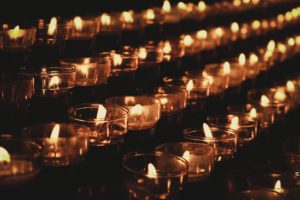
Photo by Pascal Müller on Unsplash
I came across a poem by Ursula K. LeGuin (see below) and found it beautiful and timely. The wheel of cycles and seasons has swung around to the resurrection of light once more, and we wish one another a happy new year, each of us with our own hopes and fears for the months ahead.
For much of my life, I equated love with protection. When I became a parent, the vulnerability of my sons added exponentially to my own. In common with many parents, I struggled fiercely to protect them through infancy, childhood and beyond. Naturally, we protect others from what we ourselves most fear. In my case these fears include pain, loss, addiction, abuse and abandonment. I tried to shield my children from those people and experiences that hurt me, lest they be hurt in the same ways.

Photo by Nicole Mason on Unsplash
Certainly, in the case of small children, animals and others who have no voice or are unable to use it, protection can be an act of love, but I’ve thought for some time now that we carry it too far, especially when we seek to “protect” our perfectly capable adult children, partners and friends. At some point our impulse to protect others becomes selfish. We do not want to bear witness to a loved one’s pain, let alone our own. We do not welcome the responsibility of telling the truth. Protection becomes a pathological means of disempowering others and binding them to us because we don’t want to be alone or the independence of our loved ones threatens us.
To be over-protected is to be without the freedom to develop confidence in our own good sense, strength and courage. We’re never allowed to stumble and fall and we don’t have to figure out how to comfort ourselves, clean our scraped knees and move forward. We over-protect out of fear or control, not love, and our constant vigilance of our loved one or loved ones teaches them fear as well. Fear makes our lives smaller, not bigger.
This new year, I don’t wish you photoshopped health, prosperity and happiness, and I don’t have a list of resolutions I hope will lead me to those things, either.
This year, I wish us each the ability to stand in our own power.
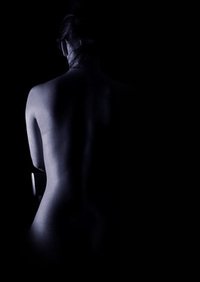 May we learn to love our bodies as they are. May we live joyfully in our skin. Let us teach our bodies new things and work with them to become as strong and healthy as we can. May we allow our bodies to be and to change.
May we learn to love our bodies as they are. May we live joyfully in our skin. Let us teach our bodies new things and work with them to become as strong and healthy as we can. May we allow our bodies to be and to change.
This year, may we make mistakes. May we become lost and confused, and then find our way again. May we find out we’re wrong, and tell everyone. May we be vulnerable, get hurt and heal ourselves.
May we wander far from home without a map and walk a thousand miles, exploring new places and ideas. May we listen to a different kind of music and read a different kind of book. May we do something we’re afraid of.
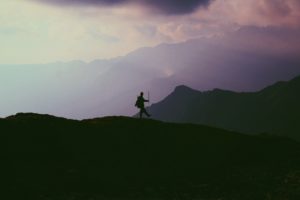
Photo by yatharth roy vibhakar on Unsplash
Let the new year bring us laughter that makes our bellies ache and tears that fall like warm rain on our anguish. Let us fall head over heels in love with something or someone as though it’s the first time we’ve ever done it and we just know it will all be perfect. Let us make friends with our rage and give it something productive to do. Let us tell someone about our deepest shame.
May we know loneliness, boredom, disappointment and humiliation, and balance them with companionship, engagement, satisfaction and validation.
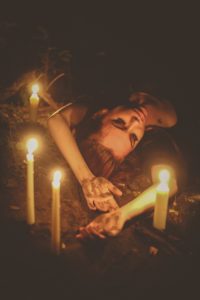
Photo by Miranda Wipperfurth on Unsplash
May we risk, dare and dream. May we learn to believe in ourselves. Let us burn our candle at both ends. Let us wear ourselves out with living. May we hear our lives whisper and speak our own truths. Let us learn and grow. Let us allow ourselves to be seen and rejected.
May we long for a home, find one, make one and lose it. May we make another and choose to walk away from it. May we learn how to come home to ourselves no matter where we are or who we’re with.
May we let go of our protection. Let us tear ourselves away from it. Let us outgrow it. May we feel what we feel with every cell of our body. May we make our thoughts, emotions, curiosity and creativity big and hold nothing back.
Go out into the sun flood of your life, my friends, my sons, my family, and know that I hold you in my heart. Know that I believe in you. Know that I neither ask for your protection nor seek to protect you, for none of us need it and love is bigger than that.
Go out from me into the new year, dear ones, and if you choose to return, please bring strange things.
Please bring strange things.
Please come bringing new things.
Let very old things come into your hands.
Let what you do not know come into your eyes.
Let desert sand harden your feet.
Let the arch of your feet be the mountains.
Let the paths of your fingertips be your maps
and the ways you go be the lines on your palms.
Let there be deep snow in your inbreathing
and your outbreath be the shining of ice.
May your mouth contain the shapes of strange words.
May you smell food cooking you have not eaten.
May the spring of a foreign river be your navel.
May your soul be at home where there are no houses.
Walk carefully, well loved one,
walk mindfully, well loved one,
walk fearlessly, well loved one.
Return with us, return to us,
be always coming home.
Ursula LeGuin
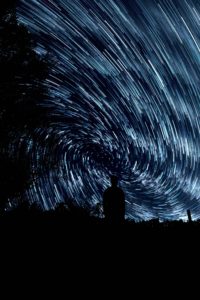
Photo by Jeremy Thomas on Unsplash
All content on this site ©2019
Jennifer Rose
except where otherwise noted
by Jenny Rose | Oct 4, 2018 | A Flourishing Woman, The Journey
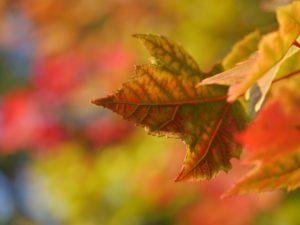
Photo by Aaron Burden on Unsplash
It’s autumn in central Maine, and the leaves are falling. Sometimes they flutter in the arms of a sly little wind under a crisp blue sky, skittering across the road in front of the car, turning me into a more cautious driver than usual because they look so much like a squirrel or chipmunk. Other days they’re torn from the trees by rain and heavy, tropical air under low grey clouds, misty at their trailing hems.
So many leaves in so many shades of copper, bronze, orange, red and yellow. A sodden chaos of leaves underfoot in the rain and an airy whirlwind of them on dry, bright days. It’s as though the trees have been holding their breath all summer and now they relax and exhale, releasing the tension of production, growth and photosynthesis, easing themselves from yesterday’s clothing and burdens, shaking and stretching in naked freedom and settling down with a sleepy grunt for winter.
Bits of the world, leaves, songs
scatter in painted light.
The days
break. –Carol Frost
The past hours, days, weeks and months litter the ground, trodden, damp and fading. Their stories, whispered to the wind, of nest and hollow; bird, insect and animal; stars and rain and dew and the secret underground life of root, soil and mycelium, are lost. From their bodies new stories for the next cycle and generation of life will green and grow.
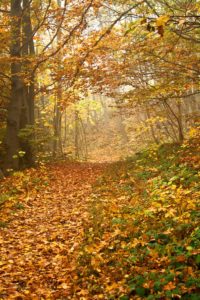
Photo by Vanessa von Wieding on Unsplash
I envy the trees their grace and patience. They know how to let go. They turn change into glory. They understand surrender to the fading light and changing tilt of the planet.
I, on the other hand, am not so graceful. Starting a part-time job, even doing something I love and am familiar with, has me wild-eyed and overwhelmed. My carefully constructed and comfortable routine is in pieces. I can’t turn the calendar page and fill in my accustomed schedule. Horrors! Now the days ahead are as naked as the bared trees, allowing me time to reconsider the true shape of things. I think of periods of change as bone time. I can’t see the bones of my life when the calendar is predictable and lists guide me through the day. Habit and routine are powerful, and after a time I stop noticing if I’m staying in balance, managing my time and taking care of my needs well. It’s only in these periods when all my schedules, lists and calendar pages are so many leaves of paper tossed onto the floor that I see the bones again.
To inventory our bones is to let go of possessions, distractions, noise, activity, thoughts, beliefs, habits and behaviors and ask ourselves what our true shape is. What are the deepest pieces of our body and soul? What is necessary in order to express our highest purpose? What destroys our time, energy and joy, and what liberates them?
Can we let go of what’s no longer useful? Can we give it to the wind, to the air, to the frost and rain and snow? Can we give it willingly, freely, with grace and beauty?
Yes, I can let things go.
But grace and beauty are noticeably absent just now!
Still, the trees in this season comfort me and show me the way. They’re not worried about next month, next week or tomorrow. They don’t seem to mind change. They release yesterday’s leaves with careless abandon and show their bones proudly to the sky. They know who they are and they take what they need without apology or shame. They rest in the security of the endlessly turning cycles and seasons.
I don’t think I’ll ever achieve their wisdom or serenity.
On the other hand, I know something about my own bones because life gives most of us more than one chance to begin again, and I’ve had lots of practice. I know shortly I’ll be back in a steady, effective, predictable routine that accommodates my new job as well as my current needs and priorities.
wind tugs leaves away
my hat begs to follow
guide me wind the way
you’re lost i’ll be lost — Kim Robert Stafford
Life is change, and change is life. Old conditions give way to new conditions, and the process is always happening, no matter how stuck or helpless we feel. Chaos comes, picks us up by the scruff of the neck, gives us a good shake, and we find ourselves flung into something new, which will in turn gradually fade away.
Leaves fall. Light wanes. We are lost, torn away from what’s familiar, and then the way ahead opens before us and we’re found again.
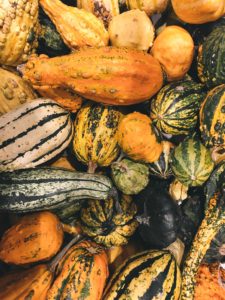
Photo by Brigitte Tohm on Unsplash
All content on this site ©2018
Jennifer Rose
except where otherwise noted
by Jenny Rose | Jun 22, 2017 | A Flourishing Woman, Self-Love
Recently I went back to the little mountain town in the Southern Colorado Rockies I called home for twenty years, and wrapped up the sale of my house. It was an important trip for me, one which I’ve been anticipating ever since I arrived in Maine two and a half years ago. My partner and I drove out and drove back. I didn’t try to blog or write on the road, but I made a lot of notes and I discovered a persistent theme.
Reclamation, according to a quickie internet search, means “the process of claiming something back or of reasserting a right” or “the cultivation of waste land or land formerly under water.” It strikes me there’s an interesting and subtle possibility of conflict in those two definitions. What exactly is waste land, and who has the power to define it? Also, what does cultivation mean? Big Ag? Monocropping? Pesticides and Roundup? Or cultivation by plants, animals and wind?
In any event, I’ve been carrying the word reclamation for some years now like a talisman. It’s a cord linking events and choices of the last years of my life together.

Photo by Tanja Heffner on Unsplash
I remember exactly when it started. I was sitting in a chair in the salon where a friend cut my hair for years. In the mirror, I could see my hair falling over my shoulders and down my back, thick and wavy and beginning to be streaked with grey. I was desolate because of a broken relationship, and I saw a woman who was unwanted in that mirror. I didn’t want to be her anymore. I wanted to be someone else. My friend asked me what I wanted to do and I told her to cut it all off. “Reclamation,” I said. I couldn’t say more because I didn’t want to break into sobs, but she knew exactly what I meant, and she tied a smock around my neck and started cutting.
My ex-boyfriend had loved my hair. I loved it, too. It made me feel sexy and beautiful and feminine. Cutting it was the first step I took on the road leading me to this attic space in central Maine, where I sit this summer morning (with short hair) writing with the windows open and the sound of crickets, frogs and birds flowing in.
I held onto that word, reclamation. It became a boat to sail away in, and then a lifeboat, and then a raft and then a spar of wood in a fathomless sea of floating debris that kept me alive until current and waves took me back to shore.
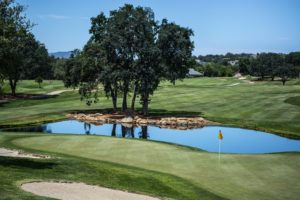
Photo by Edewaa Foster on Unsplash
The little town I lived in had no claim to fame or big dollar tourism except for a golf course. When I moved there the course was renowned for being one of the most beautiful in the country, and visitors came from all over during the summer to play there, filling the inns and RV parks. Then drought struck that part of Colorado, the golf course was sold to an absentee owner who immediately got crosswise with the town, and gradually, due to a mixture of water problems, politics and general assholery on the part of the owner, the golf course went downhill, people lost jobs, the greens became unkempt and the tourists stopped coming. Then, just about the time I left town, the golf course closed.
I don’t play golf and my living fortunately didn’t depend on the tourist trade, but every morning, just before dawn, I walked on the golf course.
I didn’t do it for exercise or as a discipline. It was my lifeline. It was the one place where I never failed. I was guaranteed solitude and peace. Nobody knew where I was. I knew the course so well I could disappear into it, be absorbed. I had several routes, one for ordinary days, one for days of grief, one for days of rage and the longest one for days of despair. I used some of the cart paths, but mostly I followed the contours and edges of the greens and walked along the river, which was generally only a trickle, if not entirely dry. I often heard owls going to roost as meadowlarks began their morning chorus. I saw bears, foxes, skunks, deer and geese.
In the days of relative plenty, maintenance men worked as early as I was walking, but I was a familiar local figure and we ignored each other. I avoided them and they only saw me at a distance. There was an elaborate sprinkler system, of course, that worked all night every night and made the whole place fresh and green and cool, a stark contrast to my daily reality of hauling or pumping grey water out to my garden because of drought and watering restrictions. I lived a five-minute walk away.
During our recent trip we only spent one night in that little town, but I woke early, slid into my clothes and walked to the golf course. I knew it had been closed altogether for some time. This year the drought momentarily broke in the valley with record amounts of snow and rain, and the river that so often dried up flooded, both on the course and through the town. As I slipped through the gates and passed the “no trespassing” signs in the dark of early dawn, I could hear the river, an amazing, miraculous sound. The scent and chill kiss in the air of running water was very different from the mechanical chik, chik, chik of an automatic sprinkler.
The cart path was rutted, muddy and overgrown. Large tree limbs had fallen and nobody cleared them away. The river actually broke out of its banks and spread across a former green. I’d seen pictures in the local paper, but I still couldn’t believe my eyes. The town sent in machinery to make barriers out of heaped-up debris and mud. Whole trees had toppled, their root balls pathetically exposed to the sky.
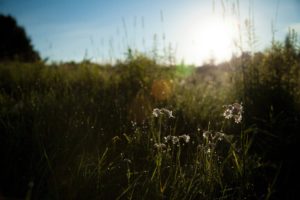
Photo by Alejandro Escamilla on Unsplash
Once, I could have walked several paths on the golf course blindfolded. I often was there in the dark. Now my footing was uncertain. The grass grew up to my waist and I kept tripping over hidden windfall branches. Weeds filled the sand traps. The greens were, of course, gone. The groomed contours that once marked my route had vanished, forcing me to slow down and move more cautiously. I strained my eyes to discover familiar slopes and hollows in the dim light.
As I moved deeper into the old course, I thought of all the hundreds of mornings I’ve spent there, praying, weeping, raging, pressing myself against nature in every mood and season. I took my joy there, my hope, my dreams, and my gratitude practice. The golf course was a place of creative inspiration, a place of guidance and comfort, a place in which to staunch wounds enough to carry on another day. I was real there. I didn’t try to hide from myself.
That highly-groomed, herbicide-gagged, shaved, enslaved, money-making piece of land (a waste land) is going wild again. It was captured, bought, and pimped by a businessman in order to create a profit. Now, Mother Nature reclaims her own. The land begins to remember itself. As I walked and the light increased, showing me myriad signs of healing, I felt akin to the land. What is happening there is happening to me. I had a pimp, too — myself. I sold myself for what I thought I was worth in order to get what I needed. Now the land and I reclaim ourselves from a bleak and limited culture that relies on chemicals, profit and power-over rather than natural cycles and cooperation.
Reclamation is not a controlled, civilized process. It’s wild, sometimes catastrophic. The river made a scar where it broke its banks and uprooted trees, but it carved out a new bed for itself. The old bed will fill in. New growth will cover all that exposed earth. The downed limbs and trees will rot and feed the soil and mycelium while native plants and grasses return. Is this what we mean by waste land? Forest fire, flood and storm are acts of nature that reshape the land and environment. Life dies and renews, one act leading to the other. We often experience reclamation as terrifying and tragic. Human beings, for the most part, don’t welcome change unless we control it.
Yet we do change. The world changes. The weather changes. Those around us change. We can neither stop nor control it in any significant way, and I’m entirely grateful for that. The golf course and I are messy. Our hair is disheveled. Our trim, neat lines are blurred. The high unmown grass through which I waded brushed against the hair on my bare legs. The water feeding the land and the water of feeling that feeds me have carved a new, wider path. Bridges and trees sag and unravel, not trash but compost for the next thing. Paths and fences fall into disrepair. Grass and saplings mingle freely, each reaching toward the other at the edges.
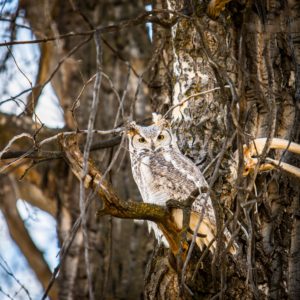
Photo by Laterjay Photography on Unsplash
Snakes, rabbits and insects live again in the shelter of the grasses. Does can leave their fawns safely concealed while they browse, and their presence will bring the mountain lions down from the foothills. Owls will find abundant mice, voles and other rodents in what was a carpet of sterile green velvet. The beaver and raccoons will no longer be trapped or shot, lest they disturb the regulated beauty of the water features or annoy the tourists. Over all this complex, creative system, the meadowlark still sings, that king of the high fields and plains, and his song still brings tears to my eyes and an ache to my throat.
That land will always be home to the woman I was. I was glad to return for a brief hour and realize my beloved place has moved on, just as I have. The land and I were both over-civilized into waste land, but now we’re reclaiming ourselves. The golf course and I reassert our right to be what we are. We surrender to change, to mess, and to the transformative edge of chaos.
All content on this site ©2017
Jennifer Rose
except where otherwise noted
by Jenny Rose | Apr 20, 2017 | Power
I came across a prayer to Baba Yaga recently. I’ve spent a lot of time with Baba Yaga, who is a supernatural female figure out of Slavic European folklore. I’ve told stories about her for years, and she’s an important character in my book. She’s a powerful life-death-life-death figure and has many names, among them Storm Raiser, Primal Mother, Lady of Beasts and Mother of Witches. In spite of our long acquaintance, I’ve only lately begun to love her.
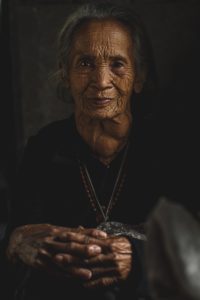
Photo by ivan Torres on Unsplash
Sometimes I think the most important thing to understand about life is power. It structures every single relationship, most of all our relationships with ourselves. Power creates wars, cults, murderers, abusers, tyrants, rebels and perhaps angels.
I believe we have a great longing for our individual mislaid power, such a longing that we’ve lost track of what it is or how to recognize it in our hunger and desperation. I don’t know how else to explain our mindless obedience to the media, to our culture, to our religions, to the almighty “they” who instruct us how to live, how to eat, what to believe, how to look, how to buy and how to be.
At this time in my life, and at this time in my country’s history, I cling to Baba Yaga, because she represents sanity in a world becoming more insane by the day. The prayer reminds me of what true female power is — and is not.
True female power wastes no time on despots and bullies who conceal their fear and impotence behind dishonesty and the willingness to use force. It’s not her business to prop them up. They have nothing she needs and they’re not worth her attention, for they shall not endure.
True female power is real. It’s authentic. It’s not bound by chains of political correctness, manners, fear or ideology. A woman in her authentic power is, according to need and whim, a child, a wild woman, a bitch, a seductive temptress, a crone, and a creature of magic. Obedience and compliance are not in her nature.
True female power seeks the hidden thing, within and without. She pares away layers, stories, masks, facades, dreams, visions, expectations, and shoulds. She’s a persistent poker, prier and meddlesome busybody in holey tennis shoes. She opens drawers, boxes and jars, looks behind forbidden doors and never stops asking questions. She refuses to shut up, close her eyes or pretend, and views everything by the stark light of a fiery skull without flinching. She doesn’t need anyone to agree with her, and she doesn’t need everyone to agree with her. She doesn’t argue with what is. The truth cannot escape her.
True female power doesn’t prostitute for love and validation. Baba Yaga eats sulfur to make her farts more momentous and fertilizes her body hair to make it grow more abundant. She’s hairy legs and iron-tipped fingers and teeth sharpened on bones. She takes a lover when she feels like it, but she kicks him out of her bed before dawn and doesn’t offer breakfast. Her body is not for sale, her hair is the color it wants to be, and she has no use for a painted mask over her face.
True female power is a teacher of magic. She teaches the sorting of one thing from another, cleansing, lighting a fire, the alchemy of cooking. She’s the power of the cauldron, the cup, the womb and the growing seed. She’s the wisdom of bone and blood, seed and water, life and death. A woman in her authentic female power learns to feed and nurture the magic of her intuition and creativity. She knows they are the most priceless jewels she will ever have.
True female power feels huge, deep feelings of rage, grief, joy and lust. When fear accosts a woman in her power, she spits in its eye and knocks it down on her way forward. An authentically powerful woman knows how to cause earthquakes with her dance, bring rain with her tears, melt rocks with her passion and sow stars with her joy. She allows no one to make her small.
True female power expresses all her fine feelings. She shrieks, curses, cackles, stomps, grumps, slams and mutters. She will not be silent. She stays up all night drumming and dancing if the mood takes her, and sleeps all day when she wants. She collects secrets, stories, marbles and insults with equal enjoyment. In fact, she says and does exactly what she wants to do and say.
(Yes, I said marbles.)
True female power is ancient and enduring. It’s coarse silver hair, aching bones, pearly stretch marks, lumpy thighs, scars and wrinkles and cracks and crevices. A woman in her power bleeds, first red and then the invisible silver blood of wisdom that arrives when the children of her body have become ghosts living only in her memory. A woman in her full authentic power smiles kindly on the young and beautiful, because they are not yet capable of her wisdom.

Photo by Cristian Newman on Unsplash
True female power knows how to live through the night alone, how to wander in the desert, how to go underground and live in a cave among the roots of life when necessary. She survives the conflagration, the invasion, the prison sentence, the betrayal, the loss, the beating, the chaos, the flood. A woman in her authentic power is rooted in the stars, in the trees, in the mountains, in the sea and in the earth. She welcomes cycles and seasons. Change is her strength. She knows how to bide her time and let die what must, because she knows her power will endure in women who come after her.
A woman in her power is not confused. She knows there’s no authentic power in money or position, youth or beauty or hairless legs. She knows her wellspring of power is internal and if she can’t find it, no one will. True feminine power defines her own success, her own goals, her own agenda, her own spiritual practice, her own beauty and her own rules.
Baba Yaga’s specialty is too-good maidens of all ages. That’s how I met her. When the Baba is finished with such a maiden, she’s either saltier and wiser or dead. Baba Yaga eats the dead ones with vinegar to cut the sweetness.
It’s a good time for prayers. Perhaps it’s always a good time for prayers. Here’s mine:
Baba Yaga, Grandmother, we offer you our sweat, tears, blood, milk and urine. Initiate us into life and death with our own blood and bone. Lead us back into love for ourselves, our bodies and our earth. Help us, your daughters, find our authentic feminine power again.
All content on this site ©2017
Jennifer Rose
except where otherwise noted
 May we learn to love our bodies as they are. May we live joyfully in our skin. Let us teach our bodies new things and work with them to become as strong and healthy as we can. May we allow our bodies to be and to change.
May we learn to love our bodies as they are. May we live joyfully in our skin. Let us teach our bodies new things and work with them to become as strong and healthy as we can. May we allow our bodies to be and to change.












